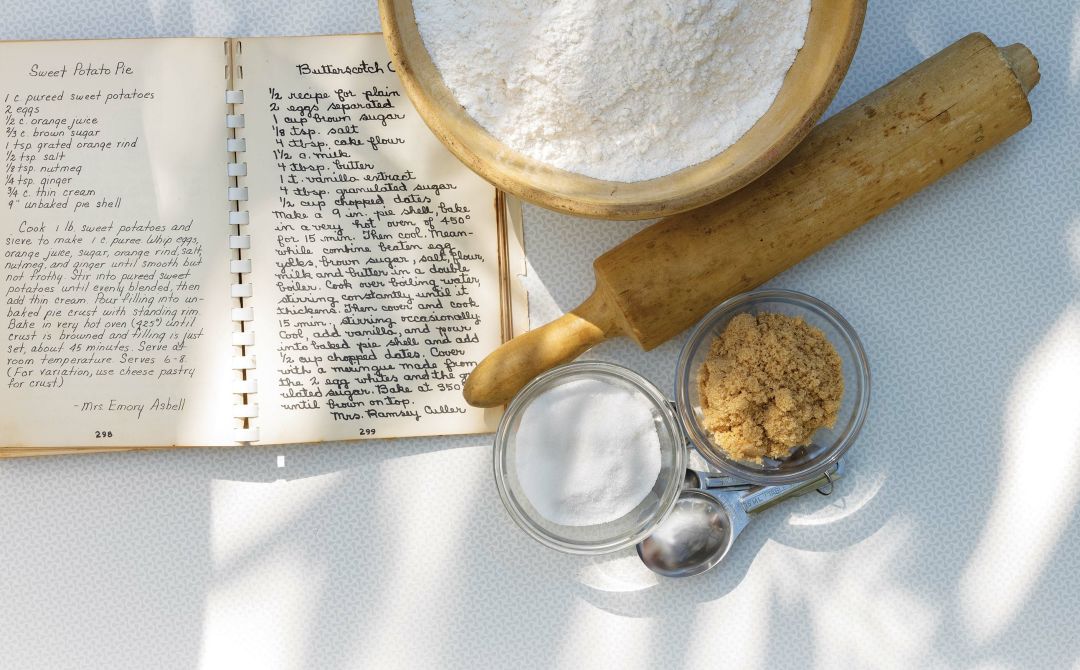The Hidden Treasures of Community Cookbooks

Image: Salvatore Brancifort
The first edition of Florida Food Fare I’m holding barely hangs together. Scotch tape wraps around the plastic binding, and the pages are brown and brittle with disintegrating corners. The book was published in 1953 by the Entre Nous Club of Bradenton, and the text on the pages isn’t typed, but scribbled in a multitude of handwritings, with amateur hand-drawn illustrations of puppies, local landmarks and ads for businesses like the Check-R-Board Feed Store. I turn a page, and it falls out.
According to the book’s introduction, members of Entre Nous, “a group of young matrons and business women,” put together and sold the cookbook to pay for scholarships, tonsillectomies and an iron lung, among other needs. Each recipe, from “anchovy puffs” to “orange surprise,” is signed by the woman who submitted it, and the book is written in a light, conversational style totally at odds with the scientific precision you find in current cookbooks. To make “baked fish,” for example, all you’ll need is “1 large fish” and “seasonings.”
Florida Food Fare is part of a fading genre—the community cookbook, created by compiling a recipe or three from members of churches and synagogues and other faith organizations and civic groups. They were often created to raise money for specific projects or charities and were popular because good recipes were hard to come by. Joy of Cooking was a household staple, but if you wanted to try something new, your best bet was to ask someone for tips after Sunday morning service.
Dig into the archives of a nearby library, and you’ll find dozens of examples in Sarasota and Manatee counties. Among them: Culinary Cullings From Competent Cooks (published by the Christ Church Guild in “Bradentown” in 1901), Bethany Baptist Church’s Sunday Dinners (cover slogan: “Kissin’ wears out… Cookin don’t!”) and Tradishun (a 1978 Sarasota Jewish cookbook that will introduce you to Golda Meir’s chicken soup). Many of the recipes are for dishes that remain standard, but others are historical curiosities. Take “7-Up Salad” in Sunday Dinners, a dessert that combines Jell-O, bananas, marshmallows, canned pineapple and a 16-ounce bottle of 7-Up. Others, like “Cortez gumbo,” found in 1986’s Southern Shoreline cookbook, are positively mouthwatering.
Tina Crawford, 96, moved to Bradenton in 1947. She was raised Methodist, but her husband was a Presbyterian, so the couple joined Bradenton’s First Presbyterian Church in 1950. Years later, she joined a committee that put together a spiral-bound cookbook called Cookin’ ’Neath the Banyan Tree that documented dishes church members liked to make.
“It’s sort of a Southern thing,” says Crawford, who now lives in a Presbyterian retirement home near the church. “Most of the things we had at the church, we didn’t have a paid cook. We had lots of luncheons and lots of dinners and everybody just thought, ‘We ought to do a cookbook.’”
Cookin’ ’Neath the Banyan Tree was a monumental endeavor by three dozen committee members. “You didn’t want to hurt anyone’s feelings,” Crawford tells me with a laugh. “That’s the reason it’s over 600 pages long.”
The book sold for $10, and the money went to help the church buy round tables for the fellowship hall. But the real purpose of compiling the recipes was to forge community. Mary Miller, 65, started going to First Presbyterian after her first daughter was born, and she served as publishing coordinator on the book.
“It was a wonderful way that you could have access to recipes that you may have tasted,” says Miller. “‘Oh, that’s Miriam’s tomato aspic. Oh, that’s what she must have brought to the potluck.’”
Miller was a young mom at the time. Making the book allowed her to spend time with older women like Crawford. “I like to call them the matriarchs,” says Miller. “We have many very strong Christian women in our church leadership. And as a young mother who was working hard to raise her family, I’m thinking, ‘How did they get like that? Will I ever be that smart or that good?’ But then I got to know them on a more personal level, and I realized they’re like me. They’re just older and have experienced more.”
As the Internet has made access to tens of millions of recipes instantaneous, and membership in religious and civic organizations has dropped, is the era of the small-town community cookbook over? Probably. But the recipes and the communion they built remain. “Although cookbooks are a thing of the past,” Miller says, “I know my own four children and eight grandchildren still use the recipes I had.”



